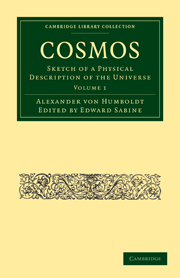Book contents
- Frontmatter
- Contents
- Title in the series
- INCITEMENTS TO THE STUDY OF NATURE: General Remarks
- HISTORY OF THE PHYSICAL CONTEMPLATION OF THE UNIVERSE
- Division into historic periods, or epochs of progress, in the generalisation of physical views
- PRINCIPAL EPOCHS IN THE HISTORY OF THE PHYSICAL CONTEMPLATION OF THE UNIVERSE
- EPOCHS IN THE HISTORY OF THE CONTEMPLATION OF THE UNIVERSE. CONQUESTS OF ALEXANDER
- EPOCHS IN THE HISTORY OF THE CONTEMPLATION OF THE UNIVERSE. EPOCH OF THE PTOLEMIES
- EPOCHS IN THE HISTORY OF THE CONTEMPLATION OF THE UNIVERSE. ROMAN EMPIRE
- EPOCHS IN THE HISTORY OF THE CONTEMPLATION OF THE UNIVERSE.—ITS ADVANCEMENT BY THE ARABIANS
- EPOCHS IN THE HISTORY OF THE CONTEMPLATION OF THE UNIVERSE.—OCEANIC DISCOVERIES
- EPOCHS IN THE HISTORY OF THE CONTEMPLATION OF THE UNIVERSE.—DISCOVERIES IN THE CELESTIAL SPACES
- RETROSPECT OF THE PRINCIPAL EPOCHS IN THE CONTEMPLATION OF THE UNIVERSE
- NOTES
- INDEX
EPOCHS IN THE HISTORY OF THE CONTEMPLATION OF THE UNIVERSE.—ITS ADVANCEMENT BY THE ARABIANS
from HISTORY OF THE PHYSICAL CONTEMPLATION OF THE UNIVERSE
Published online by Cambridge University Press: 05 August 2011
- Frontmatter
- Contents
- Title in the series
- INCITEMENTS TO THE STUDY OF NATURE: General Remarks
- HISTORY OF THE PHYSICAL CONTEMPLATION OF THE UNIVERSE
- Division into historic periods, or epochs of progress, in the generalisation of physical views
- PRINCIPAL EPOCHS IN THE HISTORY OF THE PHYSICAL CONTEMPLATION OF THE UNIVERSE
- EPOCHS IN THE HISTORY OF THE CONTEMPLATION OF THE UNIVERSE. CONQUESTS OF ALEXANDER
- EPOCHS IN THE HISTORY OF THE CONTEMPLATION OF THE UNIVERSE. EPOCH OF THE PTOLEMIES
- EPOCHS IN THE HISTORY OF THE CONTEMPLATION OF THE UNIVERSE. ROMAN EMPIRE
- EPOCHS IN THE HISTORY OF THE CONTEMPLATION OF THE UNIVERSE.—ITS ADVANCEMENT BY THE ARABIANS
- EPOCHS IN THE HISTORY OF THE CONTEMPLATION OF THE UNIVERSE.—OCEANIC DISCOVERIES
- EPOCHS IN THE HISTORY OF THE CONTEMPLATION OF THE UNIVERSE.—DISCOVERIES IN THE CELESTIAL SPACES
- RETROSPECT OF THE PRINCIPAL EPOCHS IN THE CONTEMPLATION OF THE UNIVERSE
- NOTES
- INDEX
Summary
In my sketch of the history of the physical contemplation of the universe, I have already enumerated four leading epochs in the gradual development of the recognition of the universe as a whole. These included, firstly, the period when the inhabitants of the coasts of the Mediterranean endeavoured to penetrate eastward to the Euxine and the Phasis, southward to Ophir and the tropical gold lands, and westward through the Pillars of Hercules into the “all-surrounding ocean;” secondly, the epoch of the Macedonian expeditions under Alexander the Great; thirdly, the period of the Lagidæ; and fourthly, that of the Roman Empire of the World. We have now to consider the powerful influence exercised by the Arabians, whose civilization was a new element foreign to that of Europe,—and, six or seven centuries later, by the maritime discoveries of the Portuguese and Spaniards,—on the general physical and mathematical knowledge of nature, in respect to form and measurement on the earth and in the regions of space, to the heterogeneity of substances, and to the powers or forces resident therein. The discovery and exploration of the New Continent, with its lofty Cordilleras and their numerous volcanoes, its elevated plateaus with successive stages of climate placed one above another, and its various vegetation ranging through 120 degrees of latitude, mark incontestably the period in which there was offered to the human mind, in the smallest space of time, the greatest abundance of new physical perceptions.
- Type
- Chapter
- Information
- CosmosSketch of a Physical Description of the Universe, pp. 201 - 229Publisher: Cambridge University PressPrint publication year: 2010First published in: 1846



